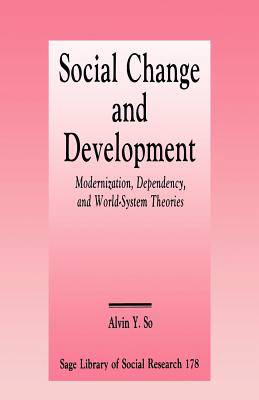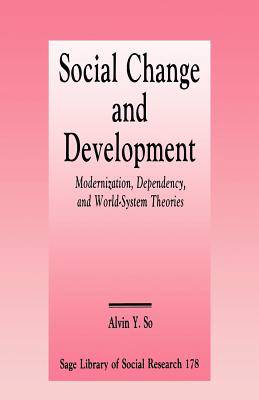
- Retrait gratuit dans votre magasin Club
- 7.000.000 titres dans notre catalogue
- Payer en toute sécurité
- Toujours un magasin près de chez vous
- Retrait gratuit dans votre magasin Club
- 7.000.0000 titres dans notre catalogue
- Payer en toute sécurité
- Toujours un magasin près de chez vous
253,45 €
+ 506 points
Description
During the past four decades, the field of development has been dominated by three schools of research. The 1950s saw the modernization school, the 1960s experienced the dependency school, the 1970s developed the new world-system school, and the 1980s is a convergence of all three schools. Alvin Y. So examines the dynamic nature of these schools of development--what each of them represents, their contributions, how they have criticized each other, how they have defended themselves, and how they were transformed. He reviews a variety of empirical studies, focusing on the "classical" and the "new" models, to show how each of the perspectives affects the study of development. In addition, this book features a unique emphasis on the research implications of the three perspectives, involving changes in orientation, agenda, methodology, and findings. Social Change and Development is the first study that compares the strengths and weaknesses of the three schools of development in a thorough, comprehensive manner. It will be of great interest to students and professionals in urban studies, development studies, political science and comparative politics. "Highly recommended." --Development Update "The book is valuable both to the beginners as well as the serious student of development ." -Indian Journal of Public Administration "The book will fill a needed niche, and better than anything heretofore." --Immanuel Wallerstein, SUNY, Binghamton "[The] book is a remarkable piece of work and will, I am sure, be of great service to many teachers and students in a number of fields." --Winston Davis, Southwestern University "Professor So has provided students of development with an excellent review of three major theories of development. He skillfully meets his goals of providing a sympathetic presentation of early expressions of each theory, reviewing major criticisms, and then presenting recent expressions of each theory that have taken criticisms into account. The use of extensive reviews of a few studies within each theory provides students with a clear image of the character of the theory, and more importantly an image of the link between theoretical development and social research. The book avoids unfair caricature of theories and research, and provides a solid basis for further study and research on issues of development." --Robert Fiala, University of New Mexico "The author has succeeded in objectively delineating each theoretical perspective so that the reader is not encumbered with attempting to separate academic theory from political ideology. This is no minor achievement and the author is to be applauded for both his efforts and his achievement of this task. . . . The book will be fascinating reading for anyone interested in the historical and contemporary functioning of nation-states and their interdependency." --Journal of Applied Rehabilitation Counseling "I would like to pass along my compliments on So′s new volume. The writing is exceptionally clear and the presentations superb." --Marc W. Steinberg, University of Michigan "A useful analysis of the major development theories. . . . A good text for students and teachers and the only study to address the research implications of the three development theories in a comprehensive fashion." --Development Bookshelf "An exceptionally useful book. . . . So′s command of the relevant literature and ability to explain complex material, as well as his even-handed (even sympathetic) treatments of three quite different (and often antagonistic) schools, makes this stimulating book useful for a variety of audiences: scholars interested in problems of Third-World development, specialists in modern world history, and even advanced undergraduates ready to tackle problems of theory." --Journal of World History "Alvin So does a thorough job of presenting three ways to understand development. . . . The writing is clear and the territory covered is vast. The result is an impressive survey." --Contemporary Sociology "Alvin So does a thorough job of presenting three ways to understand development....So provides valuable extended summaries of early and later formulations within each perspective. The writing is clear and the territory covered is vast. The result is an impressive survey, with two main audiences: advanced undergraduates and graduate students interested in a manageable overview of the field, and scholars in other fields who are interested but prefer not to retrace every step of these long and complex debates through the original texts....the book is generally balanced which is no small accomplishment." --Industrial and Labor Relations Review "Fills a gap in the social science literature in the field of development. . .useful not only for students but for faculty members teaching different courses in sociology, history, and political science. It may also be of interest to a wide and diverse non-professional audience wanting to know more of the past and contemporary research carried out by the three schools." --International Journal of Comparative Sociology
Spécifications
Parties prenantes
- Auteur(s) :
- Editeur:
Contenu
- Nombre de pages :
- 288
- Langue:
- Anglais
- Collection :
- Tome:
- n° 178
Caractéristiques
- EAN:
- 9780803935471
- Date de parution :
- 01-03-90
- Format:
- Livre broché
- Format numérique:
- Trade paperback (VS)
- Dimensions :
- 161 mm x 211 mm
- Poids :
- 399 g

Les avis
Nous publions uniquement les avis qui respectent les conditions requises. Consultez nos conditions pour les avis.






